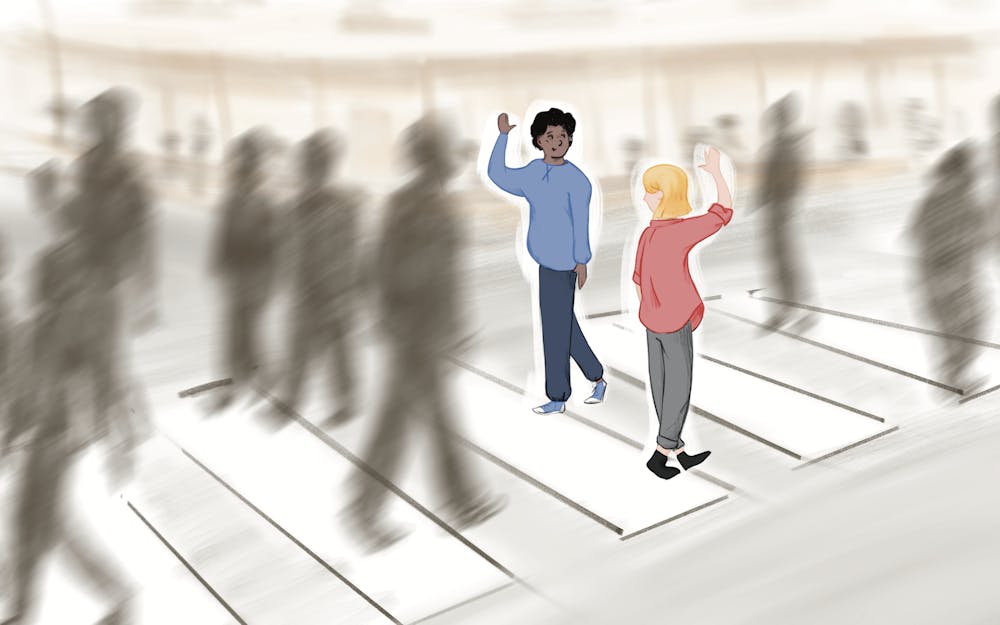“Are you trying to catch the 6:32 train at OTC?” a woman standing next to me and my friends on the sidewalk asked. We were both waiting for the pedestrian crossing light to change.
“A 6:35 train, but yes. We don’t think we’ll make it though,” I replied.
“Oh, we’ll both make it,” the woman declared. “Follow me!”
My friends and I glanced at each other and half-jogged after the woman, who was the same height as me but was walking astonishingly fast. As we raced through the streets of Chicago, out of breath, unified in our mission with this woman we had never met, I felt giddy. We ran down the steps to the Metra and she paused, quickly glancing at the board to point us to our platform.
“Thank you,” we shouted after her as she ran off — with only one minute to spare — to catch her train.
As we sat panting on the train seats, slowly recovering from our journey, we could not stop thinking about the woman’s kindness toward us, a group of people she had just met. It struck me how good it felt to share a moment of connection with someone we would never see again.
Nobody talks to strangers anymore. At bus stops and cafes, people stare fixedly at their phone and laptop screens. We hurry past each other on the street, headphones in, giving a quick nod or “thanks” to anyone who holds the door. In embracing technology that gives a facade of connection, we’ve isolated ourselves from the real humans all around us. Social media is supposed to bring people together, but it encourages us to remain sequestered in our own little world. We think we’re protecting ourselves by not speaking to strangers, but in reality, we are cutting ourselves off from a potential source of joy and connection — even in the little moments like running after a train.
As I’ve written about in the past, loneliness is at an all-time high. In 2023, the US Surgeon General released an advisory titled, “Our Epidemic of Loneliness and Isolation,” warning of rising levels of social isolation. According to the advisory, in 2020, the average American spent 24 more hours alone per month than the average person in 2003. Social engagement across many types of relationships has declined. We struggle empathizing and connecting outside of our close circles as well. Community involvement has decreased and only 30% of Americans in 2016 felt they could reliably trust other Americans, down from 45% in 1972. Talking to strangers cannot replace close relationships, but it can give us that spark of human connection we all crave.
A study found that people who shared a social interaction with a barista, with actions as simple as a smile or making eye contact, were happier and felt a stronger sense of belonging than those who made their interaction with the barista as quick as possible. Similarly, in behavioral scientists Nicholas Epley and Juliana Schroeder’s studies, they found that people enjoyed their journey on public transportation more when they chatted with the people near them.
Talking to strangers is also good for society. Speaking to strangers reminds us of our shared humanity. At first glance, I may appear to have nothing in common with the man behind the counter in the dining hall, making my sandwich. But after a quick conversation with him early in the school year, I found out that we went to the same high school — albeit decades apart. Getting to know the people in your community exposes you to new ideas, cultures and perspectives, but also demonstrates that commonality can be found between almost anyone. In short, interacting with all types of people increases our appreciation for the myriad of people around us.
So if it’s so good for us, why don’t we talk to strangers? As Epley puts it, “People systematically underestimate the benefits of talking to strangers.” Many people anticipate that talking to a stranger will be a bad experience. They worry that they will run out of things to talk about, that they will not like their conversation partner or they fear rejection. But University of Sussex senior lecturer of psychology Gillian Sandstrom found that many people underestimate how much the person they are talking to will like them.
“Research finds that people like you more than you think,” she writes.
So, maybe it's uncomfortable to approach a stranger or initiate a conversation. I certainly find myself averting my eyes when I pass someone on the sidewalk or burying myself in my phone to avoid talking to the people around me. But we must remember that uncomfortable doesn’t mean bad. We tend to focus on everything that can go wrong in an interaction with a stranger rather than everything that could go right. Once you get over that initial uncertainty, you might find a conversation to be very personally fulfilling.
As silly as it may sound, consistently practicing talking to strangers can decrease fears about future conversations. Compliment a stranger's outfit, comment on the weather or even go on a walk with a dog — dogs are people-attractors, as writer Andy Field found.
We teach ourselves to avoid eye contact, to hurry past others on the street. But think of how good it feels when you share a smile with a stranger, or when you commiserate with a random person over a long line. In a society where we have become used to drawing into ourselves, appreciate these small moments of humanity more than ever. I encourage you to put your phone in your pocket, look around, and be open to speaking to new people. You might find someone like the woman we met in Chicago, who shepherded us to our train and reminded us of the beauty of human connection.
Samantha Camire (she/her) is a freshman studying journalism and Spanish.






